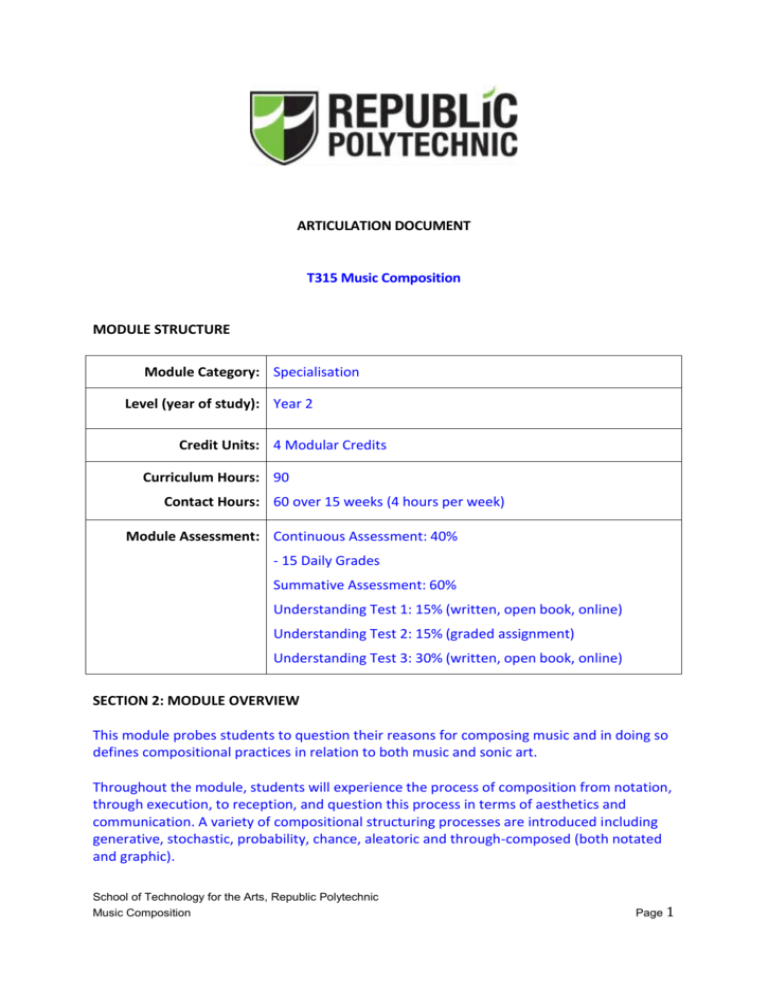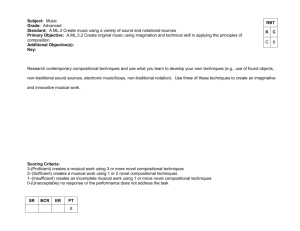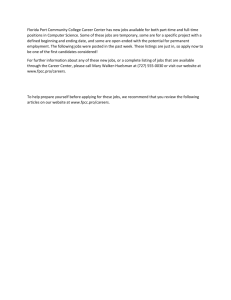T315 Music Composition
advertisement

ARTICULATION DOCUMENT T315 Music Composition MODULE STRUCTURE Module Category: Specialisation Level (year of study): Year 2 Credit Units: 4 Modular Credits Curriculum Hours: 90 Contact Hours: 60 over 15 weeks (4 hours per week) Module Assessment: Continuous Assessment: 40% - 15 Daily Grades Summative Assessment: 60% Understanding Test 1: 15% (written, open book, online) Understanding Test 2: 15% (graded assignment) Understanding Test 3: 30% (written, open book, online) SECTION 2: MODULE OVERVIEW This module probes students to question their reasons for composing music and in doing so defines compositional practices in relation to both music and sonic art. Throughout the module, students will experience the process of composition from notation, through execution, to reception, and question this process in terms of aesthetics and communication. A variety of compositional structuring processes are introduced including generative, stochastic, probability, chance, aleatoric and through-composed (both notated and graphic). School of Technology for the Arts, Republic Polytechnic Music Composition Page 1 Students will also gain familiarity of a wide range of tools for composing, including through composed tonal pieces, atonal works, improvisation as well as electro-acoustic works. Students will discover different ways of notating music. Additionally, they will be introduced to a number of acoustic instruments starting with their own body (voice and body percussion) as well as traditional Western instruments and South East Asian instruments. Modern studio based scoring and sequencing technologies form the context for this module. Students will develop their creativity as well as their compositional style and technique as they compose works which will be performed at the end of the semester. Products of this course will be valuable additions to students’ portfolios. MODULE OUTCOMES AND LEARNING OUTCOMES Upon completion of this module, students would have acquired the ability to: • • • • • • • • • • Articulate the principles behind well-crafted music composition Identify various musical attributes of different genre/musical styles, and hence be able to compose true-to-style in fulfilling a project brief Illustrate the application of various techniques such as elaboration and decoration, in melodic composition Discuss the basic tools (soft-skills) and processes in music composition Apply textural manipulation in the music composition Appraise quality of composition through developed critical listening skill Prepare score for rehearsal and recording sessions through the use of professional music notation Illustrate DAW (such as Pro Tools or Logic Pro Studio) operational competency through creation of compositional draft Illustrate continuing development of general musicianship Discuss works to greater details (such as historical and social influence) through developed research skills Allocated time per day Module Coverage Discussions in Study Cluster Articulate the principles behind well-crafted music composition Identify various musical attributes of different genre/musical styles, and hence be able to compose true-tostyle in fulfilling a project brief School of Technology for the Arts, Republic Polytechnic Music Composition Resource gathering and team work Skills acquisition and practice 2 2 2 3 2 1 Page 2 Illustrate the application of various techniques such as elaboration and decoration, in melodic composition Discuss the basic tools (soft-skills) and processes in music composition Apply textural manipulation in the music composition Appraise quality of composition through developed critical listening skill Prepare score for rehearsal and recording sessions through the use of professional music notation Illustrate DAW (such as Pro Tools or Logic Pro Studio) operational competency through creation of compositional draft Illustrate continuing development of general musicianship Discuss works to greater details (such as historical and social influence) through developed research skills Total = 15 Problems = 90 hours 1 2 3 2 2 2 1 2 3 2 2 2 1 1 4 1 1 4 1 1 4 2 2 2 TEACHING AND LEARNING This module equips students who wish to pursue a career in the Creative Industries with necessary creative, critical, and technical skills. The module emphasise traditional intellectual skills in terms of writing short reports, and conducting appropriate research when preparing for projects. Students are routinely required to conduct seminar discussions and presentations. The Module inspires and nurtures creative expression, in terms of both form and content, and in the context of both individual and group productions. Students are encouraged to analyse contemporary culture to develop their area of expertise. Throughout the module, engagement with new, digital technologies is emphasised. The module is predominantly delivered via a problem based learning style curriculum. However, up to 15% of the module uses a blend of cognitive apprenticeship and technical hands-on tutorials style curriculum. The module is predominantly taught in a classroom, professional studio and space that simulates a realistic professional setting, and also involves mini project with a simulated industry client and mini project with a real industry client. LEARNING RESOURCES School of Technology for the Arts, Republic Polytechnic Music Composition Page 3 Specialised equipment Music Notation Software such as Sibelius, Notion, MuseScore Digital Audio Workstation such as Pro Tools, Logic Pro Studio Specialised facilities Computer music suite with midi keyboard controller Sound synthesis suite with analogue synthesizer such as Doepfer. Recommended readings or references Alder, S. (2002). The Study of Orchestration, 3rd Edition. New York: W. W. Norton & Company, Inc. Aldwell, E. (2011). Harmony & Voice Leading, 4th Edition. Massachusetts: Schirmer. Collier, G. (1975). Compositional Devices. Massachusetts: Berklee Press Publishing. Jarrett, S. and Day, H. (2008). Music composition for dummies. Hoboken, N.J.: Wiley. Kostka, S. and Payne, D. (2004). Tonal harmony, with an introduction to twentiethcentury music. Boston: McGraw-Hill. Schifrin, L. and Feist, J. (n.d.). Music composition for film and television. Online resources Groove3.com, (2015). Learn Pro Tools, Logic Pro, Ableton Live and more - Training and Tutorial Videos. [online] Available at: http://groove3.com Macprovideo.com, (2015). macProVideo.com - Streaming Tutorial-Videos & HD Training Downloads for Audio, Graphics, & Video Editing Software. [online] Available at: http://macprovideo.com School of Technology for the Arts, Republic Polytechnic Music Composition Page 4




